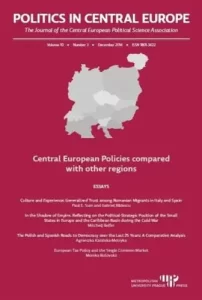Cui prodest?
Why local governance came to a deadlock in Hungary
Politics in Central Europe Volume 19 (2023): Issue 1 (March 2023)
Published Online: 2 Apr 2023
Page range: 21 – 42
Abstract:
More than thirty years after Hungary’s transition to democracy and the change of territorial governance model, the time is now right to assess the outcome. This paper is primarily an assessment, concluding that the deadlock of the Hungarian local government system can be explained not only by the centralisation efforts of the governing and opposition political elites or the continuous decline of the budgetary position, but also by the indifference of local society. The fact is that the Hungarian local governments were not protected from being squeezed out of a significant part of public services, from a narrowing of their room to manoeuvre and from their authority position being weakened, by the general constitutional provisions introduced in 1990. An important proposition of this paper is that (local) society, although still more trust‑ing of local governments than the central government according to various surveys, has not been able to become an ‘ally’ of local governments. The question rightly posed in the title of the paper is, whose interest is the local government system, who finds the values of self ‑governance important? The paper seeks (based mainly on academic literature and on its own and secondary analyses) the reasons/changes that have led to the stalemate of Hungarian local governments despite their initially strong mandate.
Keywords: public law, constitution framework, local governments, local elections, voter turnout, municipal duties



